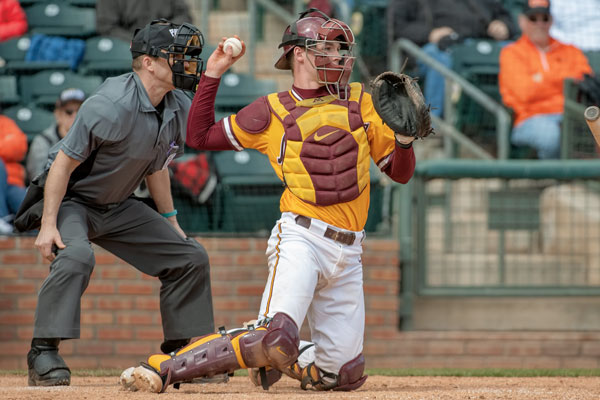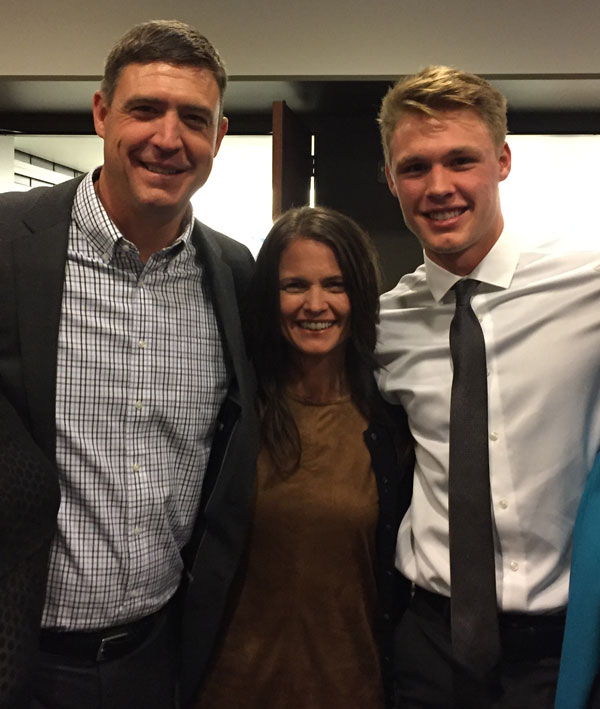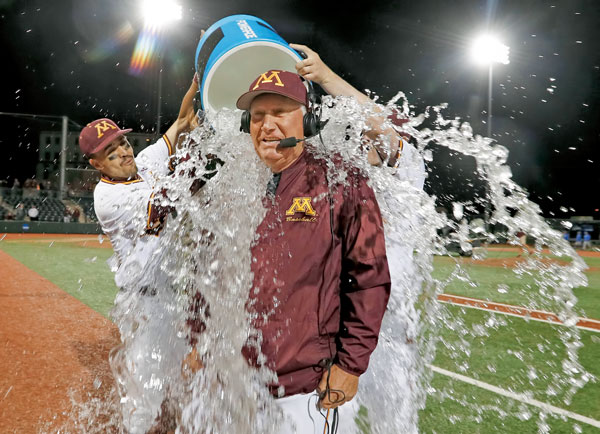With all due respect to the late, great Yogi Berra, when you watch a Gopher baseball game these days, it’s “déjà vu all over again.”
The new Siebert Field is in the same spot as the old one was for decades, on the north edge of the campus in Minneapolis, although MondoTurf and modern amenities have replaced the green grass and cozy confines. And at the start of a game, when you look behind the plate you see a lanky catcher, agile and athletic, and seemingly . . . well, at home. He’s Eli Wilson, a junior kinesiology student and one of the leaders of a Gopher baseball team that fell two wins short of making it to the College World Series in 2018. As for that sense of déjà vu, some 30 years ago Eli’s father, Dan Wilson, was starring as a catcher for the Golden Gophers before a long and successful career in Major League Baseball for the Seattle Mariners.
Eli Wilson is one of about 10 second-generation Gophers coached by Minnesota’s legendary John Anderson, ’77, since 1981. The similarities between Eli and Dan Wilson are almost eerie to Anderson.
“At times, the way Eli throws the ball back to the pitcher and some of his mannerisms remind me of his dad,” says Anderson. “Sometimes I have to catch myself and realize this is Eli, not Dan.”

In addition to inheriting his father’s body type and an innate feel for baseball, Eli Wilson absorbed his family’s dedication to education. His mother, Annie, received a degree in elementary education from CEHD in 1991 and has taught for many years. Dan returned to complete a degree in applied business in 2010 through what is now the College of Continuing and Professional Studies, due in no small measure to the urgings of Annie and his mother, Lillie.
Balance and distance
Eli Wilson grew up in the Seattle area as a sports-playing youngster like many, unaffected by the fact that his dad was a big-league baseball star and his family’s friends were other stars.
“Honestly, it kind of just felt normal,” says Wilson. “When you’re growing up, you don’t know anything different.”
He played youth baseball, but stayed away from the intensive traveling teams, opting instead to enjoy basketball, soccer, and ultimate Frisbee, too.
“My parents really wanted me to have balance,” he says. “They didn’t want me to commit to one sport too early.”
As Wilson was beginning high school, he took up the sport of cross country. Combining an endurance sport with another requiring “quick-twitch” muscles—a necessity in baseball—was a stretch, to say the least.
“I can’t believe I did it, but I definitely loved my experience running cross country,” he says. “I was never very fast […] but I loved the team dynamic. … Some of the lessons I learned in terms of mental toughness in running are very applicable to other things.”
Wilson focused more on baseball in high school, primarily as a middle infielder. But because he was a late bloomer in the sport, he didn’t draw the same attention as his father did.
“To be honest, Minnesota was the only major Division I school that was recruiting me,” he smiles.
Anderson and assistant coach Rob Fornasiere (who retired at the end of the 2018 season) saw Wilson’s talent, knew where he came from, and wanted him at Minnesota. Wilson wanted a top-20 kinesiology school and knew the strength of Minnesota in his field and on the field. A second-generation leader was born.
Wilson was a key cog on a balanced team that posted its most successful season in decades, winning the Big Ten and Big Ten Tournament championships and sweeping the Minneapolis Regional at Siebert Field, all before falling in the Super Regional to eventual NCAA champion Oregon State. He played in 53 games and batted .289 with 37 RBIs, and was selected by the Gophers for the George Thomas Most Improved Player Award.
“We came up short but a lot closer than I think I or anyone would have thought,” says Wilson. Winning the regional tourney at home (for the first time in Coach Anderson’s career) and seeing fans three-deep in the concourse, it “felt like a fairy-tale ending to an awesome season.”
As much as he’s improved himself as a player, Wilson is equally dedicated as a student and was named Academic All-Big Ten as a sophomore. That makes his mother especially proud, since she says school has never been easy for him.

“He’s taken school so seriously,” says Annie Wilson. “He does all the tutoring hours, and takes advantage of everything that’s offered to him, and just works really, really hard.”
“My whole thing as an educator with my kids, is ‘I want you to love to learn,’” she adds, “and he, probably of all my kids, has taken that in and understands it’s the process—and the learning—that’s important. And if you’re doing that the right way, the grades will come.”
Annie says Eli also has a seriously good sense of humor.
“When he’ll say something, it’s that much funnier because so much of the time he’s so serious and on task and doing what he’s supposed to do,” she says.
Helping other athletes succeed
However his baseball aspirations pan out, Wilson sees a career at the intersection of athletics and medicine, either as a high school athletic trainer—where he could serve different teams and athletes—or as a Division I collegiate trainer, perhaps for a baseball team. “I’m not exactly sure at what level,” he says, “but I definitely know I want to work with athletes in an athletic-medicine context.”
His experiences at the U of M, both with strength coaches and trainers, have helped to clarify that direction.
“All they want is for us to be on the field playing, because they know that’s what we love,” he says. “It’s pretty inspiring to watch how hard they work just to make sure that we can be out competing.”
In the meantime, he has at least one more season of collegiate baseball for the Gophers, with hopes of replicating last season’s array of big crowds, conference titles, and NCAA tournament success.
“I don’t think we fear any program or any team out there anymore—I think we’ve gotten past that,” Wilson says. “So now it’s just a matter of doing the work that it takes to get ourselves in a position again to have a chance to play for Omaha, and then just kind of finishing what we started.”
His head coach is confident in his baseball future beyond 2019.

“He’ll be able to play at the next level,” Anderson says. “He’s going to get a chance. But I don’t think it defines him. He’ll have a degree and move on and do what he wants to do.”
Eli’s father is naturally more pragmatic.
“He’s been very level-headed about it and understands both sides of the coin,” says Dan Wilson. “He knows through experience and hearing us talk about things just how important pursuing both avenues is—school and baseball. I think he hopes to be drafted and have a chance professionally, but he understands the reality of that.”
Eli Wilson is fully aware of the odds against professional baseball fame and fortune, odds his dad managed to defy, and isn’t getting ahead of himself. And he’s had a lifetime of messaging on the value of education beginning with his grandparents and continuing with Dan and Annie.
“They always stressed to me that school is first and anything that happens with baseball is Plan B,” he says. “At the end of the day, at some point my baseball career is going to come to an end.”
As his career options begin to come into focus, there’s always the possibility of a Plan C. As the catcher and quote machine Berra once pointed out: “If you come to a fork in the road, take it.”
It’s a pretty good bet Eli Wilson will do well on any path he takes.
Read more about Gopher baseball at Gophersports.
Story by Rick Moore | Photos courtesy of University Athletics except as indicated | Spring/summer 2019 (3/1/19)
 Eli Wilson
Eli Wilson